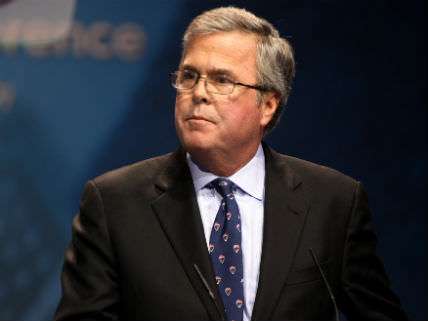Jeb Bush Wants to Compromise on Mass Surveillance—By Giving the NSA More Spying Power
The presidential candidate is reaching out to civil libertarians...by telling them they're wrong.

Here's the good news: Former Florida Governor Jeb Bush, who is currently fighting to hold onto second place in the GOP primary contest polls, says he wants to find common ground with civil libertarians over the surveillance programs conducted by the National Security Agency (NSA). "There's a place to find common ground between personal civil liberties and NSA doing its job," he said in Atlanta yesterday, according to the Associated Press.
In theory, at least, that's a welcome move from a candidate who just a few months ago described the NSA's bulk phone records collection program, which indiscriminately sweeps up call data from millions of innocent individuals, as "the best part of the Obama administration" and said that he didn't even understand the heated debate in Congress and elsewhere.
Maybe Bush has finally realized why some people might be a bit bothered by the idea of an indiscriminate, secretive mass-surveillance program that has been ruled, by various courts as both unconstitutional and illegal according to the statute it operates under, especially one that has never been definitively shown to produce effective results?
Or maybe not.
That's where the bad news comes in: Bush apparently thinks that the way to compromise is to give the NSA even more power. "I think the balance has actually gone the wrong way," he said.
Indeed, Bush doesn't even seem to think there are real civil liberties violations involved, the AP report indicates:
Bush doubled-down Tuesday on his assertions that there is "no evidence" the data collection violated civil liberties. "I've found not one" case, he said.
Here I will link to the American Civil Liberties Union's brief on government surveillance activities under the Patriot Act, which essentially makes the case that the very existence of many of the surveillance programs operating under the law constitutes an ongoing violation of the civil liberties of millions of people.
It sounds as if Bush still does not really understand the debate over the NSA's surveillance activities.
Bush also complained about the use of encryption by tech companies, arguing that they should give government agents backdoors into their files, and—because why stop when you're on a roll?—said that American should send addition troops to Europe to hold the line against Russian military activities, warning that Russian President Putin should be aware that there's a "price to pay" for his aggression.
All in all, it was yet another reminder that Jeb Bush plans to double down on the broadly hawkish posture of his brother George W. Bush's administration. Or perhaps this is just how Bush believes he can reach out and find common ground with those who have soured on foreign adventurism, and worry that the U.S. is too quick to use military force abroad.

Show Comments (43)